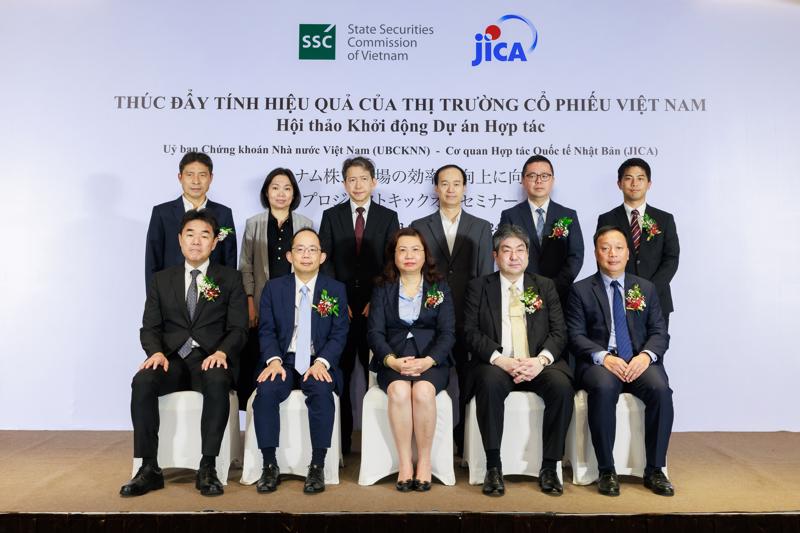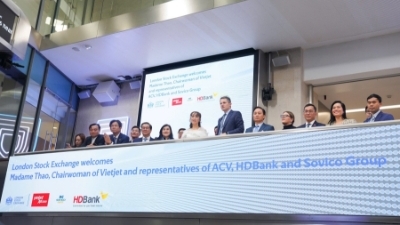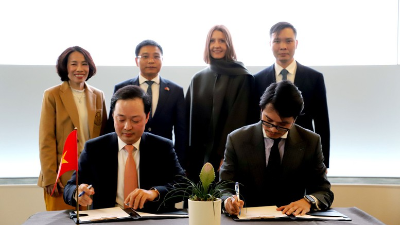The State Securities Commission of Vietnam (SSC), in partnership with the Japan International Cooperation Agency (JICA), recently launched the Technical Cooperation Project for “Capacity Building on Promoting Efficiency of the Vietnamese Equity Market”.
This project builds on the earlier initiative, "Capacity Building to Improve Fairness and Transparency in the Vietnamese Stock Market," which JICA implemented from 2019 to 2023.
Running until 2027, the new project involves JICA experts providing technical assistance to the SSC and three stock exchanges in Hanoi and Ho Chi Minh City through consultations and capacity-building initiatives. Key focus areas include market supervision, securities market inspections, oversight of intermediaries, and ensuring compliance with international standards for listings and public offerings.
“This project will also raise awareness among listed companies about their responsibility to protect investors,” said Ms. Vu Thi Chan Phuong, Chairwoman of the SSC. “With JICA’s vast experience in developing Japan’s stock market, they are well-positioned to support Vietnam’s efforts to modernize its own stock market in alignment with our strategic goals.”
The partnership aims to enhance the SSC’s capacity to manage the market and protect investors' interests as Vietnam works towards a market upgrade. The JICA initiative will also accelerate the integration of Vietnam’s stock market into ASEAN and global financial systems.
By the end of August, Vietnam’s stock market capitalization exceeded VND7 quadrillion ($283.07 billion), reflecting a 19 per cent increase since the end of last year. Foreign investors currently hold about $50 billion worth of shares, representing 17 per cent of the market's capitalization.
Fostering stock market collaboration
The new project comes at a time when Vietnam is implementing its "Strategy for the Development of the Securities Market to 2030." Japan continues to support Vietnam’s efforts to further enhance regulatory authorities’ capacity and upgrade the equity market, which is crucial for the country's socio-economic development.
JICA’s Chief Consultant, Mr. Kazunobu Kojima, highlighted the potential of the SSC-JICA projects to contribute to Vietnam's upgrade to "emerging market" status and its integration into the global capital market. He added that by 2030, it would be a great achievement to strengthen Vietnam’s primary market and adopt international equity capital market standards.
He elaborated on how the new project will focus on three main areas:
First, ‘Strengthening market surveillance capabilities’ – to improve detection and prevention of unfair trading by securities authorities and exchanges.
Second, ‘Improving the quality of market intermediaries’ – focusing on securities and fund management companies.
And third, ‘Improving capabilities in managing public offerings and listings’ – aligning public offerings with international standards and improving listing standards, disclosure, and examination processes.
"We are expected to support legal reforms related to each theme, discuss specified topics with market participants, assist in the creation of operation manuals, and hold seminars for listed companies," Mr. Kojima shared.
Drawing interest from Japanese investors
There is significant potential interest from foreign investors, including Japanese investors, in the Vietnamese stock market, Mr. Kojima emphasized. If large companies and emerging businesses with investment appeal raise funds through IPOs and go public, a substantial influx of foreign capital is expected. Unfortunately, IPOs and new listings on the Vietnamese stock market have been stagnant in recent years.
Additionally, he went on, the best opportunity for foreign investors to invest in Vietnamese stocks is through participation in an IPO. However, Vietnam’s current IPO auction process makes it difficult for them to engage. In this regard, it is hoped that an IPO method compatible with international standards, such as underwriting or book building, will be established.
Regarding the third area of the newly launched project, “Improvements in public offerings and listings in line with international standards,” it is anticipated that this could lead to significant positive changes for foreign investors if progress is made in shifting Vietnam's current IPO process from auction to an underwriting and book building method, where IPOs are launched simultaneously with listing approval. “If this can be achieved, foreign investors, including Japanese investors, will have the opportunity to invest in attractive newly listed stocks from the IPO stage, which is expected to significantly increase their investment opportunities in Vietnamese stocks,” Mr. Kojima concluded.









 Google translate
Google translate